Are you curious about your financial reputation? Maybe you’re planning to apply for a loan, or you’re just interested in understanding your creditworthiness. Whatever your reason, checking your CRB (Credit Reference Bureau) score is an important step in managing your financial health.
Many people are unaware of how to access this crucial information, or they might feel intimidated by the process. But don’t worry – it’s simpler than you might think. In this guide, we’ll walk you through the straightforward steps to check your CRB score and gain insight into your credit standing.
Let’s dive in and demystify the process of checking your CRB score!
Also Read:
How To Get CRB Clearance Certificate
How To Check Your CRB Report/ Score
In Kenya, three licensed Credit Reference Bureau institutions are authorized to check on non-performing loans:
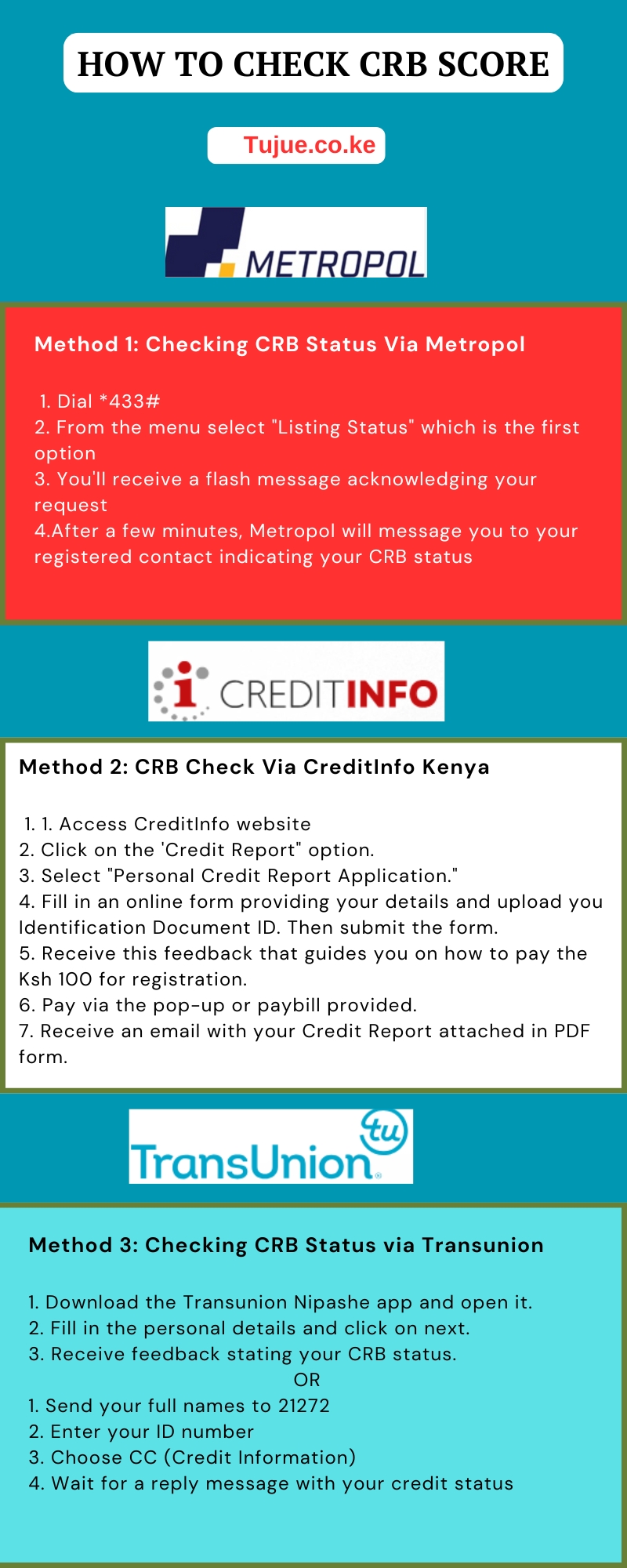
How To Check CRB Score Infographic
Checking CRB Status Via Metropol
Metropol CRB is a trusted credit reference firm in Kenya that also offers credit management, credit rating, and consultations. Follow these steps to check your CRB status with Metropol:
1. Access Metropol via website, the Metropol Crystobol app, or by dialing *433#.
2. Register to Metropol:
– Pay Ksh.100 through PayBill Number 220388 or by M-Pesa pin prompt

– Enter your ID number as the Account Number if using paybill.
– You’ll receive a confirmation message with a unique code, Reference Number, and a link
3. After registration check your listing status using USSD.
-Dial *433#
– From the menu select “Listing Status” which is the first option
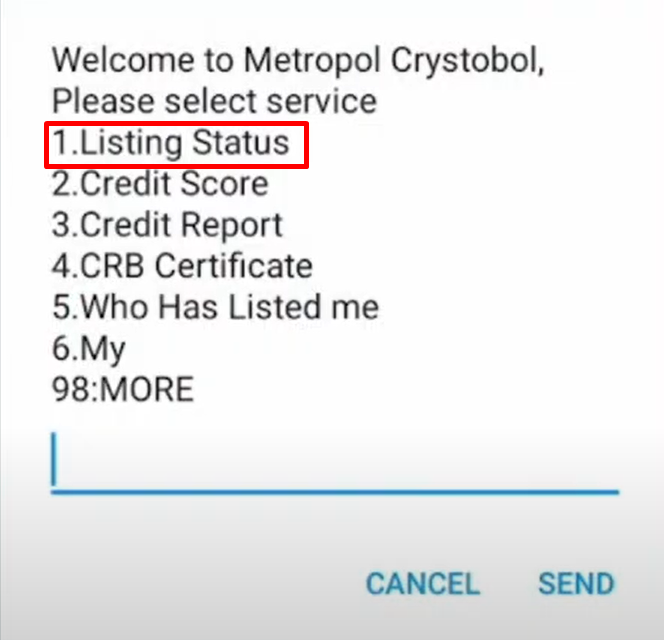
– You’ll receive a flash message acknowledging your request
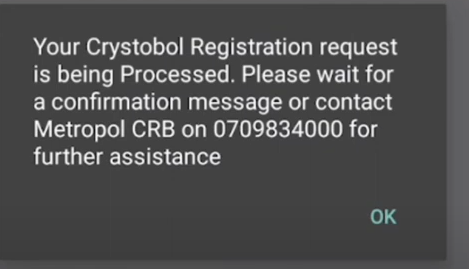
– After a few minutes, Metropol will message you to your registered contact indicating your CRB status.
The status can either be:
Gold Listed – Good Credit History
Black Listed – Bad Credit History
Green Listed – No Credit History
CRB Check Via CreditInfo Kenya
CreditInfo Kenya is part of the multinational Creditinfo Group. You can chec your CRB status using CreditInfo through these step;
1. Access CreditInfo website
2. Click on the ‘Credit Report” option.
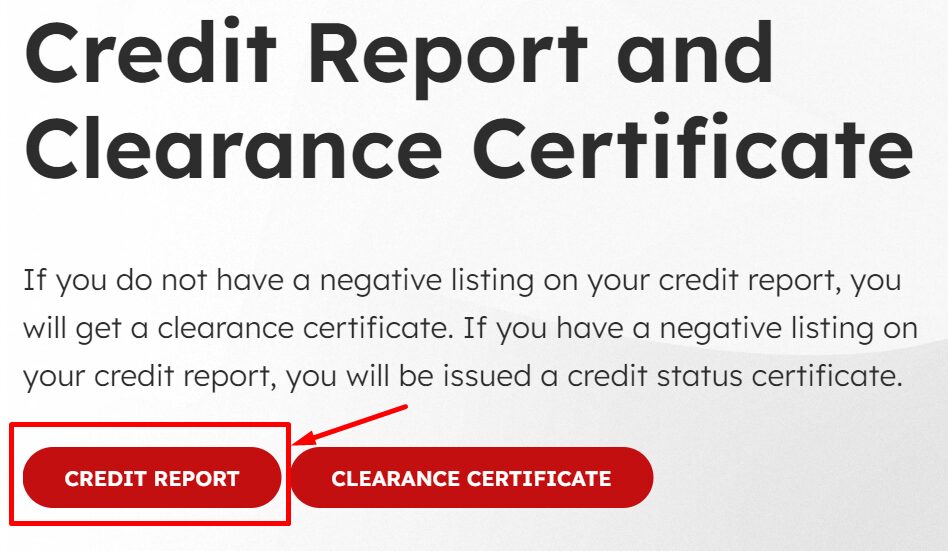
3. Select “Personal Credit Report Application.”

4. Fill in an online form providing your details and upload you Identification Document ID. Then submit the form.
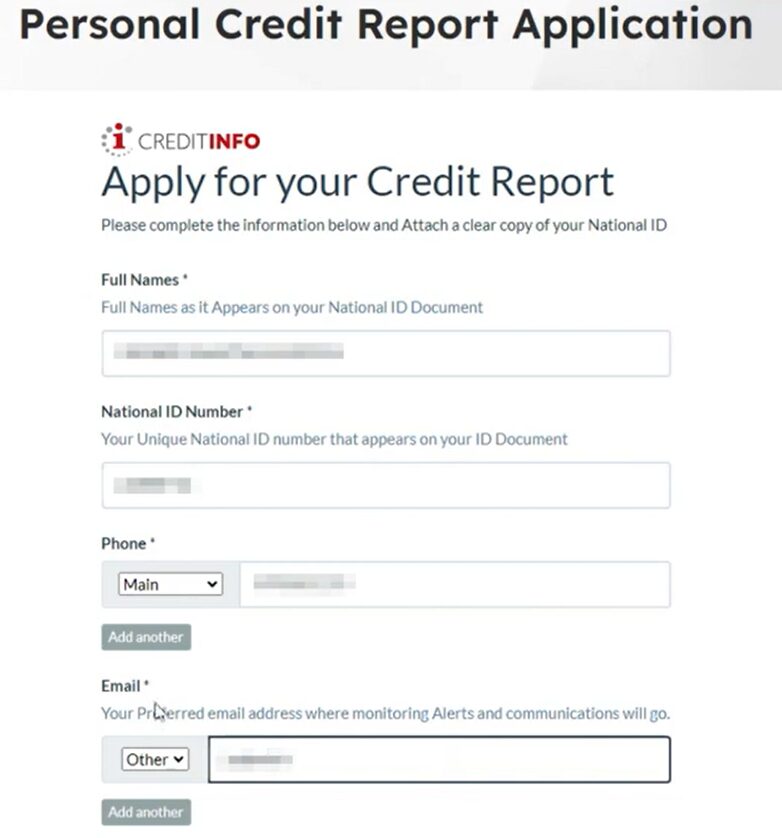
5. Receive this feedback that guides you on how to pay the Ksh 100 for registration.
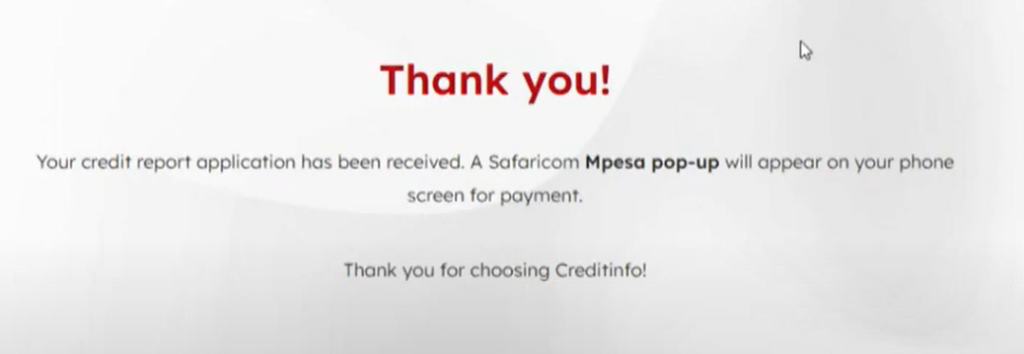
6. Pay via the pop-up or paybill provided.
7. Receive an email with your Credit Report attached in PDF form.
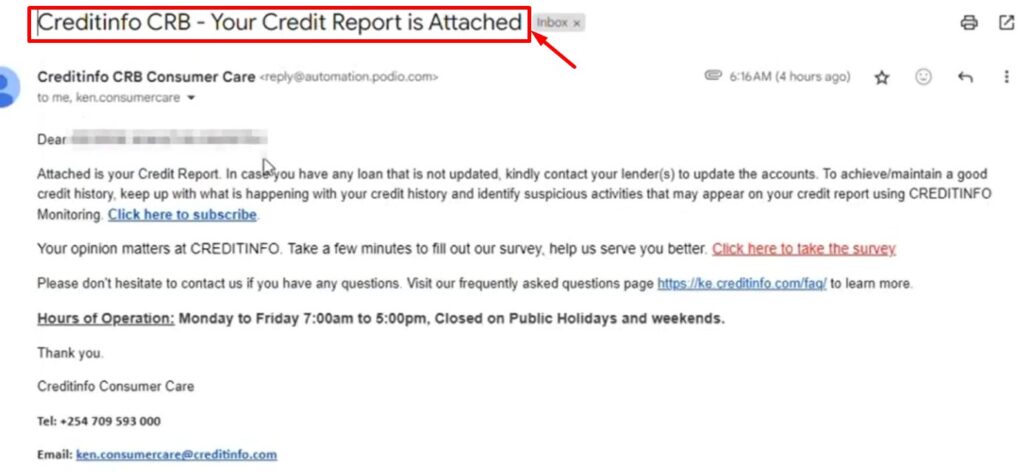
8. Download the report and analyze it. The report contains:
– Your personal details on the top left.
– Credit information predictor
– Your credit score
– Payment profile status
– Creditors and debtors in the last 12 months
Note: Checking your CRB status/ downloading your report via CreditInfo is free for the first time within 12 months but if you need to download the report subsequent times within 12onths, charges apply.
Checking CRB Status via Transunion
Transunion is an international credit referencing company based in South Africa.
To check your CRB status with Transunion, you can use two methods:
a. Transunion Nipashe App
1. Download the Transunion Nipashe app and open it.

2. Fill in the personal details and click on next.

3. Receive feedback stating your CRB status.

b. Transunion SMS Code:
1. Send your full names to 21272
2. Enter your ID number
3. Choose CC (Credit Information)
4. Wait for a reply message with your credit status
Note: Transunion has two credit status interpretations:
– “Good”: Not blocked, good credit score
– “Default”: Defaulter, cannot access loans
According to some recent news by Transunion CRB, more than 7 million people in Kenya fall under the “defaulters’ category, which makes up a quarter of all the loan accounts owned by Kenyans.
Additional Information: You can apply for a CRB Certificate of Clearance using either of these three licensed Credit Reference Bureau institutions but you have to pay Ksh 2200.
What Is A Good Credit Score
A good credit score typically falls within the range of 721 – 780, according to the VantageScore 3.0 scoring model. This is the model used by TransUnion when providing credit scores. As your score improves and moves through this range, you may experience greater financial flexibility and opportunities.
Credit Score Ranges
| Rating | Score Range |
|---|---|
| Very Poor | 300 – 600 |
| Poor | 601 – 660 |
| Fair | 661 – 720 |
| Good | 721 – 780 |
| Excellent | 781 – 850 |
It’s important to note that these classifications are guidelines rather than strict rules defining good credit.
While some individuals aim for a perfect score of 850, it’s not necessary to reach this level to enjoy the benefits of good credit. You can use these ranges to set and track your credit score goals, but remember that they don’t guarantee approval or denial for credit applications. Lenders consider various factors beyond just the credit score when making decisions.
How To Get A Good Credit Score
Achieving a good credit score is a crucial step towards financial freedom and better opportunities. And just like Frank Abagnale states, your income does not limit you from achieving a good credit score as long as you borrow within your means:
“Whether you’re earning $7 an hour or $700,000 a year, it’s very important to protect your credit rating.”
Some of the ways to achieve a good credit score include:
1. Keep Balances Low
Maintaining low balances on your credit accounts is crucial for a good credit score. Credit utilization, which is the amount of your available credit that you’re using, plays a significant role in credit score calculations.
Aim to keep your utilization below 30% of your credit limit, but remember, the lower, the better. This approach not only helps your credit score but also gives you some financial flexibility for unexpected expenses.
2. Make Payments On Time
Your payment history is a critical factor in determining your credit score. Consistently making on-time payments across all your accounts shows lenders that you’re reliable and responsible with credit. This applies for eligibility to many credit facilities including banks like KCB and mobile loan facilities like Fuliza.
Tip: To avoid missing payments, consider setting up automatic payments for your bills and credit accounts.
3. Apply For Credit Wisely
While credit is often necessary for major life purchases, it’s important to be strategic about when and how often you apply for new credit.
Each credit application typically results in a hard inquiry on your credit report, which can temporarily lower your score. Apply for new credit only when you truly need it, and avoid multiple applications in a short period. This measured approach helps maintain a healthy credit profile.
4. Use Credit Cards Responsibly
If you have a good credit score, you may qualify for rewards credit cards that offer perks like cash back or travel points. While these can be beneficial, it’s crucial to use them responsibly. Don’t fall into the trap of overspending just to earn rewards.
Always prioritize your financial health over accumulating points or cash back. Use these cards as tools to enhance your finances, not as a reason to increase your spending.
5. Monitor Your Credit Regularly
Keeping a close eye on your credit report and score is an essential habit for maintaining good credit. Regular monitoring allows you to quickly spot and address any errors or fraudulent activity.
Many services offer free credit monitoring, making it easy to stay informed about changes to your credit profile. By staying vigilant, you can take prompt action on any issues that might negatively impact your score.
6. Maintain A Diverse Credit Mix
Having a variety of credit types can positively influence your credit score. This might include a mix of revolving credit (like credit cards) and installment loans (such as a mortgage or car loan). However, it’s important to only open accounts that you actually need and can manage responsibly.
Tip: Don’t take on new credit solely for the purpose of diversifying your credit mix; instead, let it happen naturally as you meet your financial needs over time.
7. Keep Old Accounts Open
The length of your credit history is another factor in calculating your credit score. Keeping older credit accounts open, even if you rarely use them, can benefit your credit age.
This doesn’t mean you should keep accounts with high fees, but if you have long-standing accounts in good standing, it’s often advantageous to keep them open. A longer credit history can demonstrate to lenders that you have more experience managing credit responsibly.
Good Luck
Checking your CRB score is a crucial step in managing your financial health and creditworthiness. By regularly monitoring your credit status through TransUnion, Metropol, or Creditinfo, you can stay informed about your financial standing and address any issues promptly.
Remember, a good credit score can open doors to better loan terms, employment opportunities, and financial flexibility. Take control of your financial future by making it a habit to check your CRB score periodically and work towards maintaining or improving your creditworthiness.

